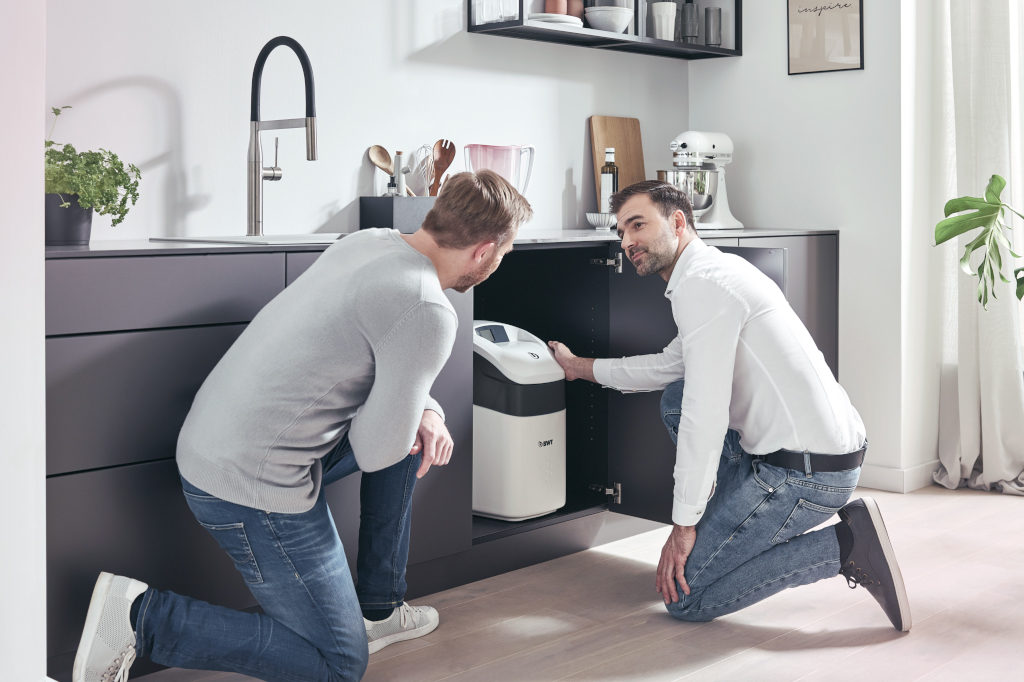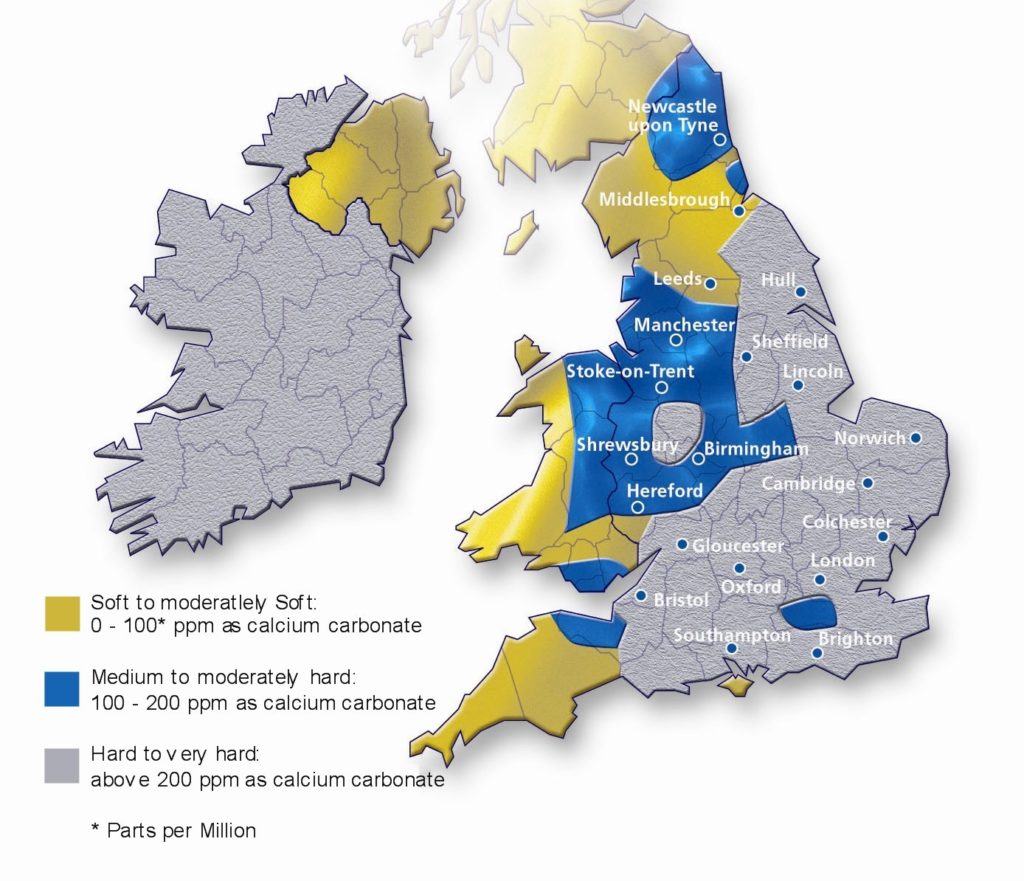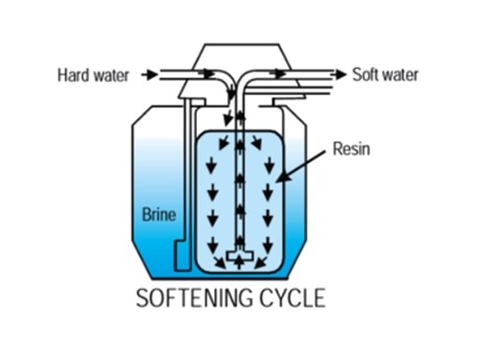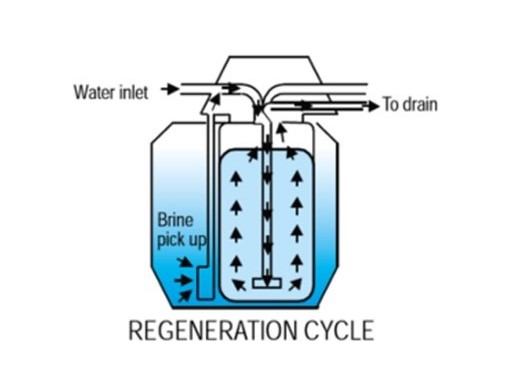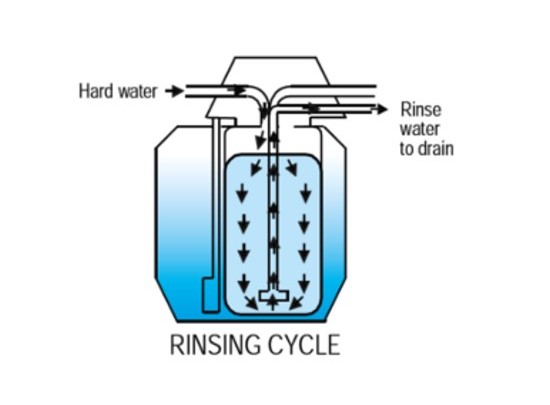The water that we use in our homes comes from a variety of sources, including rivers, streams, lakes, reservoirs, springs, and groundwater. The water from these sources may contain different amounts of minerals such as calcium and magnesium. The higher the concentration of these minerals, the harder your water is, resulting in limescale build up in your home. At BWT, we help homes to overcome these challenges by treating their water where it enters the home with one of our exclusive range of water softeners.
To help you find the right water softener for your home, we have created a step-by-step guide that talks about hard water problems, water softeners, and factors to consider when purchasing one for your home.
What is a Water Softener?
A water softener is a water treatment system that helps in reducing the water hardness and is ideal for homes with a hard water supply. They are designed to remove the excess minerals from the water, such as calcium and magnesium, that are associated with water hardness. The resulting softened water which is delivered to you via your plumbing system can be used mostly as you would ordinary tap water but you will need to use less shampoo, soaps and detergents.
Water that is available to us is mostly classified into two broad groups: hard water and soft water. Hard water contains a high concentration of calcium and magnesium, that results in problems like limescale build-up. Soft water, on the other hand, contains very low amounts of these minerals and is kinder to your and your home.
The amount of minerals in the water determines the water hardness, which varies from one area to another. Water hardness is determined by the amount of calcium carbonate in the water and is categorized as below.
Soft : 0 to 100 mg/L (calcium carbonate in the water)
Moderately Hard : 100 to 200 mg/L
Hard : 200 to 300 mg/L
Very Hard : 300 and above mg/L
Problems with Hard Water
In terms of hard water in the UK, Scotland and Wales have larger areas with soft water. This is in comparison to England, which has more hard water areas, with the hardest water in Norfolk, Suffolk, and the Southeast of England. The reason for this is that the water in these areas source their water reserves from ground water that has passed through limestone and chalky rocks on its way to the local reservoir. These rocks contain a high concentration of calcium and magnesium minerals, which increase the mineral content of water and cause it to harden. As a result, people in these areas are often subjected to the adverse effects of hard water in their daily lives.
Let’s take a look at the most common issues with hard water.
- Limescale formation within your household appliances. When water is heated, the calcium crystallises and forms limescale. This limescale accumulates in your appliances such as kettles, dishwashers, and washing machines, reducing their overall efficiency.
- Limescale also affects your heating system, resulting in poor performance and lower efficiency. The limescale build up in your heating system can have an insulating effect as well as reduce the volume of water moving around the heating loop. This increases the amount of energy required to heat the water and the amount of stored energy available to heat the radiators, which spikes your heating bills.
- Hard water can wreak havoc on your plumbing system, and limescale build-up can lead to more breakdowns and higher maintenance costs.
- The minerals in hard water affect your skin as well, making it dry and itchy. According to studies from the King’s College of London, it is also associated with Eczema and can aggravate it, making your skin feel more uncomfortable.
- Your clothes can lose their softness and colour when washed with hard water regularly, making them feel scratchy against your skin when you wear them.
- Your hair loses its shine and appears dull because excess minerals form a layer on your scalp and you tend to use more shampoo, often resulting in frizzy and dry hair.
- The minerals also leave unpleasant stains on water taps, surfaces, and cutlery. It also causes soap scum to build up on bathroom surfaces like bathtubs and toilets, which is difficult to remove. As a result, it is likely you will spend more time and money on cleaning.
- Hard water will eventually cost you money whether in maintaining your appliances or the need to buy more cleaning products, affecting your overall household budget as well as impacting the environment.
How does a water softener work?
Water Softeners work by directing your incoming water supply through a carefully designed resin bed. The calcium and magnesium ions are attracted to the resin beads and in the process replaced with sodium ions. When the resin bed becomes saturated with calcium, the system is regenerated by flushing it through with a brine solution. This clears away the calcium ions and recharges the resin with sodium ions. All ion exchange water softeners work in this way but have different kinds of controls to regulate the regeneration process.
- Time clock: Traditionally these were the cheapest to buy, but the most expensive to run. The clock is set to regenerate the system every few days irrespective of how much water has been used.
- Metered: This type of control measures how much water has been used in the home and decides when to regenerate automatically – usually at night when the household is asleep.
- Metered with proportional brining: This is the same as the previous system, except that it works out how much of resin bed needs to be regenerated and calculates the exact amount of brine the water softener will need to complete the process. Our BWT water softeners will build up a history of your water requirements and calculate the most economical regeneration pattern. This could help you to save salt, water, and money..
How does Water Softener Regeneration work?
A water softener works by passing hard water through a cylinder containing ion exchange resin. The resin inside the softener is designed to absorb all the hard minerals, calcium, and magnesium, and replace them with sodium ions turning hard water into Silky Soft Luxury Water. Because the resin can only attract certain amount of these minerals the resin needs to be periodically regenerated to work effectively.
The regeneration process has 3 stages.
Stage 1: Water Softener Softening Cycle
The resin consists of tiny beads that attract and retain the hardness minerals, allowing the now softened water into your household water supply.
Stage 2: Water Softener Regeneration Cycle
Periodically, these resin beads are automatically cleaned and regenerated by rinsing with a small amount of brine (a salt solution).
Stage 3: Water Softener Rinsing Cycle
All this takes place automatically, all that remains for you to do is occasionally top up with salt.
Which salt can be used in Water Softeners?
Salt is essential in the regeneration of your water softener. When dissolved in water it creates the brine that is used in the restoration of the resin beads that sit at the heart of a water softener and effectively remove minerals from hard water using the process of ion exchange
There are 3 types of salt typically used in water softeners.
- Tablet Salt: Tablet shaped buttons of salt
- Granular: Large granules or shards of salt
- Block Salt: Large rectangular salt blocks
Please ensure that you are feeding salt in your water softener at regular intervals, the exact amount and when, will depend on your water consumption, the type of salt and the water softener model you are using.
To enjoy a continuous supply of water softener salt, you can simply visit BWTShop and subscribe to the salt of your choice and get exciting discounts.
How to install a Water Softener?
Water softeners are directly installed into your plumbing system, which requires some plumbing work, a little more than installing a washing machine but not as much as a boiler usually. It is well within capabilities of a keen DIYer with some plumbing experience like with most home improvements. If in doubt please consult a certified water softener installer to ensure the system is fitted well and performs to the best of its ability.
BWT specialises in water softeners and has partnered with a large network of professional installers who are fully trained on our extensive range of water softeners. All BWT water softeners include FREE home commissioning, and when you choose our Installation package you get an exclusive service from one of our chosen local certified installers, from initially inspecting your plumbing system to the final set up.
To check the earliest availability in your area and to get more details about the BWT water softener installation, click the link below.
BWT Luxury Water Softener Survey
Factors to consider before buying a Water Softener
When looking to buy a water softener, it is important to consider the following factors.
- The first step is to test and determine how hard your water is. This will help you in selecting the best water softener for your home. To test your water, use the code HWTK1 at the checkout to get BWT FREE hard water test kit. Simply pay our standard P&P or add to a qualifying order for free delivery.
- Understanding your water consumption is important if you are to choose the right size of the water softener. Water softeners come in varying sizes from those that you can slide under a kitchen sink to those that are large enough to fill a room . Buy too small and your new water softener will regenerate too often and could even struggle to keep with demand. Buy too big and you won’t benefit from the efficient use of salt and water. As a rough guide in the UK we use approximately about 140 to 160 litres per person per day (more if you have teenagers in family that like to shower). Simply multiply the number of people in your household most days by 140 if you are a light water user and 160 if you seem to always have the washing machine on. Now multiply your result by 3. Three being the number of days between each regeneration. The total can now be used to compare with the softened water capacity of your short-listed appliances. See example below.
People in Household = 5
Average water users = 140litres
Days between regenerations = 35 x 140 = 700 l x 3 = 2100 l , Ideal water softener capacity > 2200 l
- Another critical factor to consider is the cost. When we talk about cost, it doesn’t just mean the upfront cost, but also the ongoing costs of maintaining and running the system over time. Usually, users focus on the upfront cost they are paying for the system and forget to consider the other ongoing costs like maintenance, warranty claims, and other long-term expenses. To get the best value for money, make sure you have factored all types of ongoing cost plus all important cost-savings.
- Always go with a high-quality water softener. Cheaper products may appear enticing, but they may not last long and can cause frequent problems. A high-quality water softener, on the other hand, will provide better performance and lower operating costs in the long run. Make sure the water softener you choose is WRAS certified, which means the products have met the industry standards and are safe to use. All BWT product components are WRAS (Water Regulations Advisory Scheme) approved in the UK, and each model has been tested and found to be fully compliant with European norm 14743.
12 Myths about Water Softeners
- A water softener requires a lot of space: Most modern BWT Luxury Water Softeners will easily fit into a standard 500mm kitchen cupboard.
- A water softener works by adding salt to the water: Whilst a water softener uses salt in the process of softening your hard water it does not add it to the water you use in your home. The salt is used to refresh the resin that removes the hardness minerals that cause scale and scum.
- There is no difference between a scale inhibitor and a water softener: A water softener removes the minerals that cause limescale from the water. A physical water conditioner does not remove these minerals, and whilst it will inhibit the build-up of scale it will not offer the lifestyle benefits of Luxury Water.
- You cannot drink softened water: There is no real reason why the average person can’t drink softened water, and in most cases, it is simply a matter of choice. However, softened water does contain a very slight increased amount of sodium (this will increase with water hardness) and for that reason, it is not recommended for people who are on a low sodium diet or for the preparation of baby formula milk. See Water Supply (Water Quality) Regulations 2000 for more details.
- Softened water tastes salty: The truth is that softened water will taste different, but it is myth that it will taste salty. The salt used in the regeneration process does not enter your water supply. The light increase in sodium is a result of the ion exchange process where sodium ions are exchanged for the hardness minerals that cause the water to be hard in the first place.
- Water softeners are expensive to run: Water softeners only require periodically top up of salt, water for the regeneration process and a minimal amount of electricity. The exact amount will vary depending on the size of the household and the local water hardness. The saving on toiletries, household cleaning and laundry products can also offset any running costs reducing the impact on the family budget to a minimum.
- Water softeners use large amounts of salt: The amount of salt used will depend on the model of water softener you select, the type of salt and the amount of softened water you use. Generally, a modern water softener fitted to a four-person family home will use about 10 x 25 kg bags per year* data based on 140 litre per person per day.
- Water Softeners can only be fitted in the kitchen: Modern water softeners are typically fitted in a kitchen cupboard, but can equally be fitted in utility room, garage and even outside (in a specially constructed cabinet), providing there is access to the incoming mains water supply and a suitable drain.
- Water softeners don’t require any servicing or maintenance: This is not true, like any domestic appliance, your water softener will benefit from the occasional professional service, whether as part of a planned service agreement or an ad-hoc visit. For free advice, call our service team today on 01494 83810
- Water softeners don’t last very long: There is no guarantee how long a water softener will last. However, it is not unusual for a water softener to last in excess of ten years when correctly installed and serviced in a family home.
- I still need to use salt in my dishwasher: It is unlikely you will need to use additional salt in your dishwasher, simply follow your dishwasher’s instructions to set its internal water softener to the off position or its lowest soft water setting.
- Boiler manufacturers do not recommend fitting a softener – so I cannot fit one in my home: Many boiler manufacturers now recognise the benefits of fitting a water softener in your home and provide explicit instructions for water softener owners. These include filling the primary/ radiator circuit in your home with only un-softened water/hard water and then adding the appropriate amount of chemical scale inhibitor. This can be simply achieved by by-passing the water softener during the installation and setup of the primary circuit.
Where can I buy a water softener?
BWT Luxury water softeners are available from all good plumbing merchants, DIY stores and online. For exclusive manufacturers offers don’t forget to visit the BWTShop for the most comprehensive and up to date information on all our model ranges.
The BWTShop is your one-stop shop for home water treatment solutions. We specialise in water softeners drinking water systems and a full range of associated technology driven products All designed so you and your family can enjoy water at home that is perfect for you.

